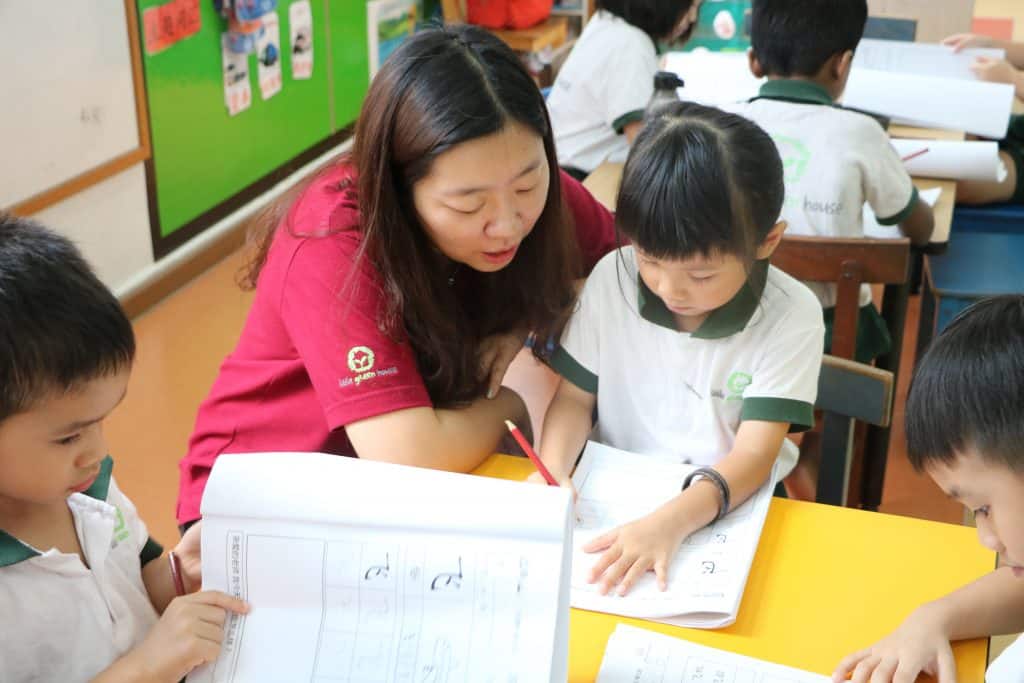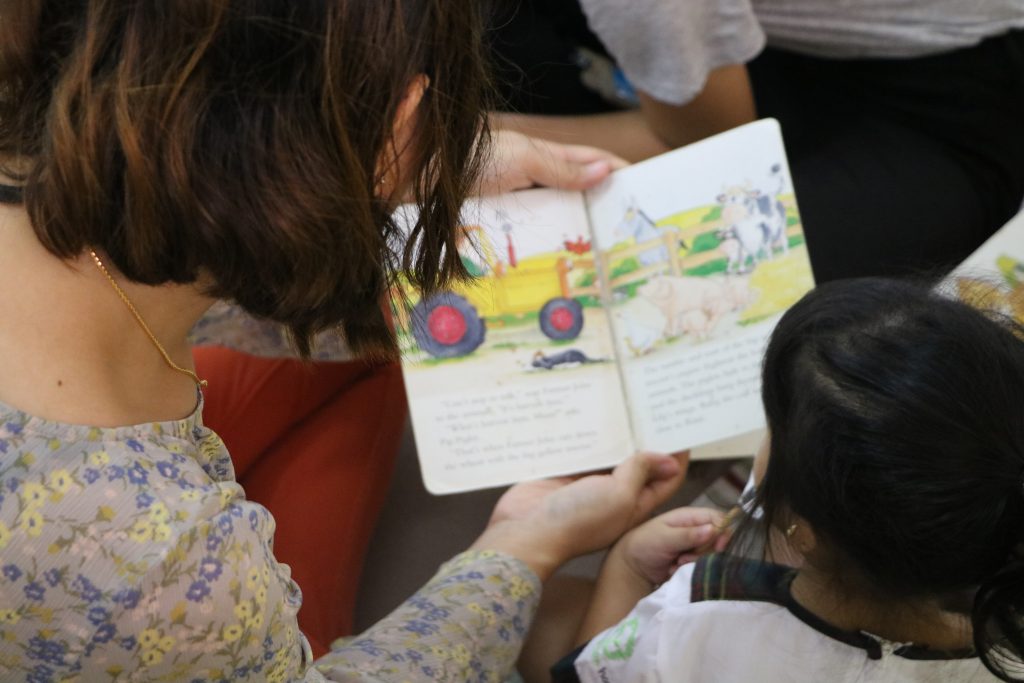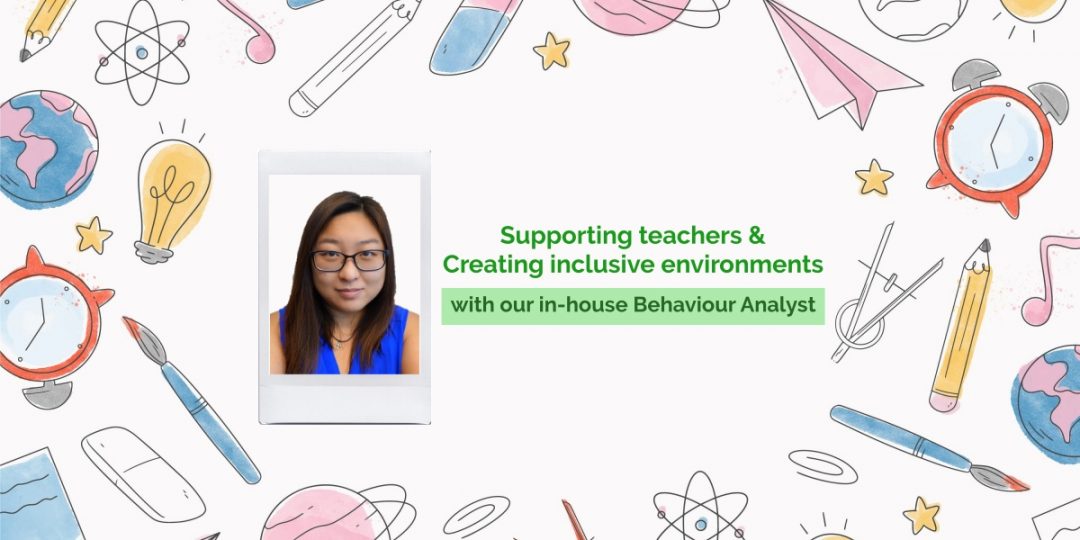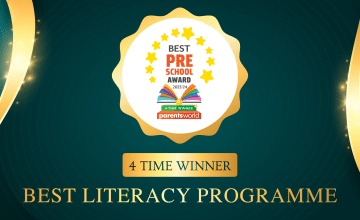Supporting Teachers and Creating Inclusive Environments with our in-house Behaviour Analyst
- Feb 16, 2021
- By Marketing
- In Uncategorized
- 0 Comments
Wondering why your child has frequent emotional outbursts – tantrums and meltdowns? Feeling at a loss as to how to understand your child, prevent them from having an outburst, or even responding to the meltdowns effectively?
Indeed, emotional outbursts are among the greatest challenges of parenting and it is even more crucial in the preschool settings as children are learning to socialise and get along with their peers. Preschool teachers then play important roles as they work together with parents in managing atypical behaviours.
At Little Green House, our in-house behaviour expert, Ms. Tracy Yang, who is also Singapore’s first Qualified Behaviour Analyst (QBA) and a Board Certified Behaviour Analyst (BCBA) shares with us some tips on how she helps preschool teachers and in turn, parents deal with children’s emotional meltdowns and atypical behaviours.
Did you know?
Behaviour analysts specialise in creating, implementing, evaluating and supervising a variety of programmes and interventions to increase positive behaviours in young children.
A day of work for Ms Yang usually begins with a cup of coffee, armed with her laptop as she prepares herself for the next Zoom training or a virtual observation session. In the first half of 2021, she holds a series of Zoom training sessions to equip Little Green House’s teachers with the knowledge and skills to manage and encourage positive behaviours in children. The 4-part teacher training series started in January 2021 as part of the Chrysalis Programme, a revamped professional development framework to raise the competencies of preschool teachers.
When the clock strikes at 10am, you probably won’t be able to catch her as she has scheduled trainings and observation sessions one after another, stopping briefly for lunch. In her observation sessions, she “sits in” (via Zoom) to observe how teachers manage different situations that occur in the classrooms. We managed to catch up with her, before she starts her sessions, to find out a little bit more about how Little Green House’s in-house behavioural analyst supports teachers in creating inclusive environments in the preschool classrooms.
What are the trainings about?
Ms Yang responded with a question instead, asking us why a child would choose to throw a tantrum during shower time. She analysed the situation by vividly describing what is happening and asking us to think about the reasons for the child’s behaviour and to reflect how we would respond and what we would have done in that scenario.
By doing so, she reiterates that equipping preschool teachers with the skills to manage children’s behaviour is essential as it helps to enhance communication, creates an inclusive environment, and strengthens teacher-child relationship.
– Enhances Communication
Many of us are simply at a loss when a child has a temper tantrum or an emotional meltdown such that we perceive that the child was simply having one of those “difficult” days.
Ms Yang then enlightens us, “well, I believe that what we adults see as atypical behaviour in children, be it throwing tantrums, screaming, or walking around when a class is ongoing for the slightly older children, is actually an act by the child because they are unable to communicate their feelings and thoughts to their caregivers.”
We learnt that instead of viewing the child as a “difficult” child, we can be more attuned to their ways of conveying their feelings and thoughts, and teach them better ways to communicate. Especially for children who are too young to talk, Ms Yang shares that Little Green House teachers are equipped to help children pick up gestures to communicate with their peers, teachers, parents, and caregivers. Consequently, meltdowns will occur less frequently when children are better able to communicate their feelings and thoughts.
– Creates an Inclusive Environment
There are times when we come across children with mild or moderate developmental or special needs in our classrooms. Currently, in Singapore, there is more support and provision for inclusion for children with special learning needs in the Primary and Secondary school settings. In the same way, if we can render more support to preschool teachers in this area, children with mild developmental or special needs will then have increased opportunities to learn in the company of their peers and teachers can also help to create an inclusive environment to help all children embrace differences and view one another as unique individuals.
– Strengthens Teacher-Child Relationship
“When teachers are equipped with the relevant skills, knowledge and know-hows, they will better understand why children react the way they do and it would help to allay the concerns and stress teachers may have when faced with a child that exhibits atypical behaviour. We will also see fewer instances of meltdowns in the classroom.” says Ms Yang.
Furthermore, since teachers know their own students best, Ms Yang feels that it can be more effective to guide teachers through strategies and interventions on how they can reduce such occurrences of atypical behaviour or meltdowns in the classrooms. She also recognised that young children require time to “warm up” to someone new and rather than having a stranger talk to them, they can relate to their teacher better and this fosters a more positive learning environment that strengthens the teacher-child relationship and rapport in the long run.

Why do you have to observe teachers?
“Sometimes, when teachers are caught in the situation, it is hard for them to realise what they did that might have led to an outburst or a meltdown from a child and to figure out how they could have responded or prevented the behaviours then. As a third-party observer, I will then be able pick up more details on what is happening in the classroom and then come together with the teacher to discuss more effective ways to improve their approach of managing the child’s behaviour,” Ms Yang responds.
Also, she sees the observation of teachers as a way to help teachers accurately apply the techniques and strategies taught. Little Green House’s staff have been trained to collect specific and objective data on behaviours that occur to understand the reasons behind the behaviours, leading to a more targeting approach to help teachers manage and address these behaviours.
“Should teachers still have difficulty managing the situation, I will also head down to the centres to observe the situation and guide the teacher on utilising a more customised strategy” shared Ms Yang passionately.

Will parents be involved?
“Yes, certainly. Very often, we would involve the child’s parents and check-in to see if the child is also exhibiting similar behaviour at home. At Little Green House, we seek to develop a child holistically hence looking into how a child is at home and working in partnership with parents to implement similar strategies at home and at the Childcare centre would definitely be more effective and helpful to the child,” Ms Yang shared.
All in all, temper tantrums and emotional outbursts are what a child goes through when he or she are unable to regulate their behaviours due to the inability to communicate. If we can help children find ways express themselves and communicate with us, then perhaps they can better convey their thoughts and express their feelings to avoid meltdowns.
About Ms. Tracy Yang
Ms. Tracy Yang holds a Master in Science in Applied Behaviour Analysis (ABA) and is both a Board Certified Behaviour Analyst (BCBA) and Singapore’s first Qualified Behaviour Analyst (QBA). She has experience working in multidisciplinary settings with psychologists, speech therapists, occupational therapists, physiotherapists alongside teachers and parents to help children cope with their behaviours in a holistic manner. Since 2015, she has worked with children and adolescents with developmental disabilities in United Kingdom, Dubai and Singapore and has provided numerous training sessions to teachers, parents and therapists.
Currently, she is Little Green House’s very own in-house Behaviour Analyst. She supports our early childhood educators in helping them to better manage and care for children, and in turn nurture budding writers, fluent readers, confident speakers – in short, Literacy Smart Kids!
Find Out More About Our Award-Winning Programmes
Book a virtual tour with Little Green House to find out how its award-winning curriculum can help prepare your child for his or her Primary years and beyond! Explore our centres from the comfort of your own home with our Virtual School Tours!










